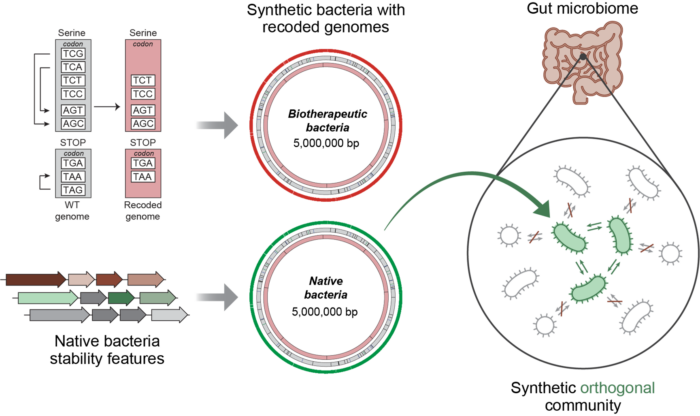

Synthetic biology enables us to control certain genetic programs and introduce novel phenotypes in model bacteria such as E. coli, though as a field we lack the ability to comprehensively engineer the bacteria we know significantly affect human health. The Robertson lab develops genome engineering tools for the de novo synthesis of non-model gut bacteria, with the ultimate aim of reprogramming the microbiome to study and modulate human health. These aims build on the key contributions I have made while at the LMB for the total synthesis of E. coli genomes as well as applications for the resultant recoded bacteria. In particular, the potential of sense codon reassignment to generate orthogonal genetic communication systems (e.g. viruses can’t infect our cells) provides a powerful approach to address unmet needs for the stability and biosecurity of current gut bacterial models used to study the microbiome. To this end, as a synthetic genomics lab within PNAC we redesign, synthesize, and deploy bacterial species abundant in the microbiome.

The total synthesis of native bacteria with orthogonal genetic codes, notably, would improve their genetic stability and moreover enable their programmable deployment as biotherapeutics which sense and respond to diseases. As a long-term goal, de novo genome design and synthesis technologies will lead to entire synthetic cellular communities that can be used to interrogate and improve human health in a biosecure manner. Collectively, our research merges the fields of synthetic genomics and microbiome reprogramming.
Selected Papers
- Robertson WE, Funke LFH, de la Torre D, Fredens J, Elliott TS, Spinck M, Christova Y, Cervettini D, Böge FL, Liu KC, Buse S, Maslen S, Salmond GPC, Chin JW. (2021)
Sense codon reassignment enables viral resistance and encoded polymer synthesis
Science 372: 1057-1062 - Fredens J, Wang K, de la Torre D, Funke LFH, Robertson WE, Christova Y, Chia T, Schmied WH, Dunkelmann DL, Beránek V, Uttamapinant C, Llamazares AG, Elliott TS, Chin JW. (2019)
Total synthesis of Escherichia coli with a recoded genome.
Nature 569: 514–518 - Zürcher JF, Robertson WE, Kappes T, Petris G, Elliott TS, Salmond GPC, Chin JW (2022)
Refactored genetic codes enable bidirectional genetic isolation.
Science 378: 516-523
Group Members
- Angus Armstrong
- Rodrigue Lefevre-Morand
- Gonzalo Mendoza Ochoa
- Dhriti Rao